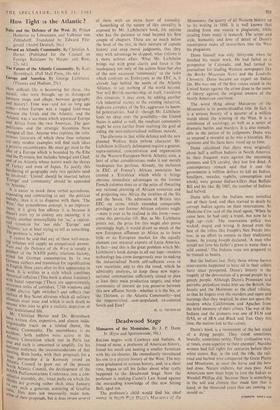Deadwood Stage
RACISM begins with Cowboys and Indians. A friend of mine, a professor of American history, found his small son beating a smaller Jamaican with his six-shooter. He immediately introduced his son to a picture history of the West. The boy soon graduated to serious history, and, in a short time, began to tell his father about what really happened to the Deadwood Stage. Now the professor is making Custer's Last Stand against the marauding knowledge of this new Sitting Bull, aged ten.
The professor's child would find his chief source in Jacob Platt Dunn's Nfas.:-acrcs c; the Mountains, the quarry of all Western history up to its writing in 1886. It is well known that stealing from one source is plagiarism, while stealing from many is research. The scope and style, humanity and love of detail of Dunn's masterpiece make all researchers into the West his plagiarists.
Dunn himself was only thirty-one when he finished his major work. He had failed as a prospector in Colorado, and. had turned to journalism for leading Western newspapers like the Rocky Mountain News and the Leadville Chronicle. Dunn became an expert on Indian life. His was one of the first voices raised in the United States against the crime done in the name of liberty against the original owners of the North American continent.
The worst thing about Massacres of the Mountains is its penny-dreadful title. In fact, it is a serious history of a quarter of a million words about the winning of the West. It is a storehouse of sociology, as well as a series of dramatic battles and murders. It is also remark- able in the justice of its judgments. Dunn was as unusual a moralist as he was a historian. His opinions and his facts have stood up to time.
Dunn calculated that there were originally about half a million Indians in North America. In their frequent wars against the oncoming pioneers and US cavalry, they lost few dead. A contemporary remark said that it cost the government a million dollars to kill an Indian. Smallpox, measles, syphilis, consumption and whisky were greater Indian-killers than Buffalo Bill and his like. By 1885, the number of Indians had halved.
Dunn tells how the Indians were swindled out of their land, and then starved to death by corrupt Indian agents on their reservations. As Medicine Cow said of the local agent, 'When he came here, he had only a trunk, but now he is high up—rich.' The reservation policy was wicked, stupid and wrong. It forced even the best of the tribes like Joseph's Nez Perces into war, in an effort to remain in their traditional homes. As young Joseph declared, 'A man who would not love his, father's grave is worse than a wild animal.' The Indians were not prepared to be treated as beasts.
But the Indians lost. Only those whose barren reservations happened to have oil in their cellars have since prospered. Dunn's history is the tragedy of the destruction of a proud people by a greedy people. Although Dunn's Protestant and patriotic prejudices make him see the British, the Jesuits and the Mormons as the chief villains, so that he lingers over the murders and rapes and burnings that they inspired, he does not spare the modern white Californians and Apaches from the brief memory of their crimes. The war of the Indians and the pioneers was one of FLN and OAS, or of IRA and Black and Tan. Only this time, the natives lost to the colons.
Dunn's book is a monument of the last stand of a dying people. They stood sometimes brutally, sometimes nobly. Their civilisation was, at times, even superior to, their enemies'; Navaho women had full rights for centuries before their white sisters. But, in the end, the rifle, the rail- road and barbed wire conquered the Great Plains and Mountains, as once the horse and the bow had done. Nature endures, but men pass. And Americans now must hope to love the Indian as Wendell Phillips did, 'because there is something in the soil and climate that made him that is fated, in the thousand years that are coming, to mould us.'
Mart EW SINCI A IR


































 Previous page
Previous page